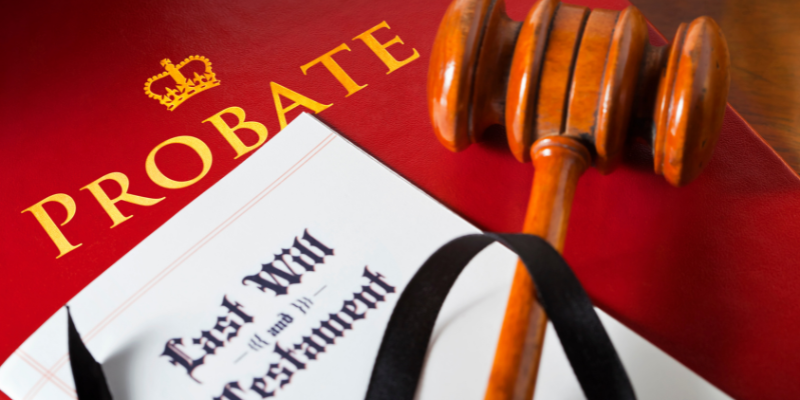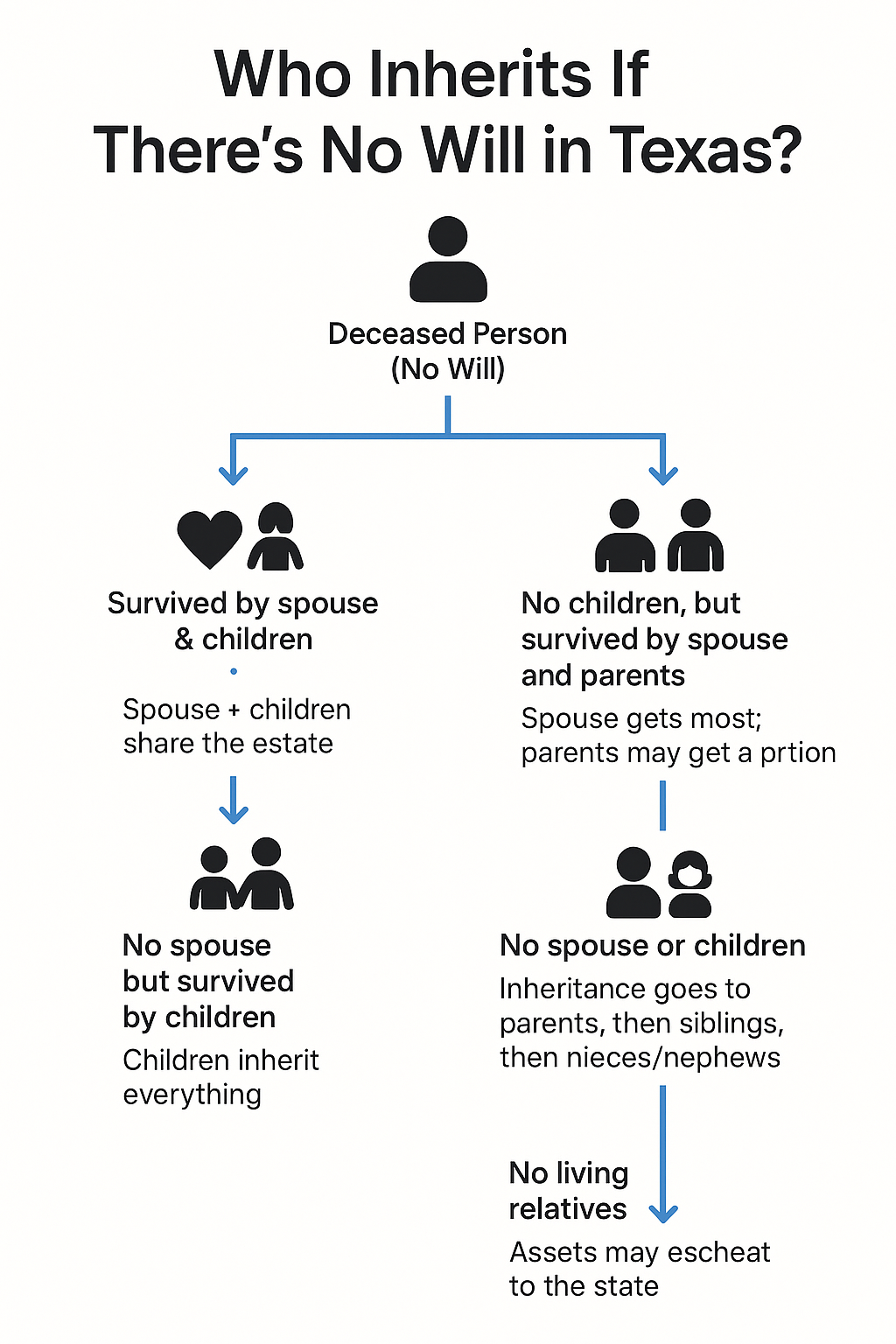
Understanding the Probate Process in Texas
When someone passes away in Texas, their assets don’t automatically transfer to loved ones. If there’s no valid will or trust in place, the state steps in through a legal process called probate. This process ensures that the person’s property—like real estate, money, or belongings—is properly passed down to the rightful heirs or beneficiaries.
In this guide, we’ll walk you through each step of the probate sale process in Texas and help you understand the roles of everyone involved—from the executor to the heirs. Our goal is to make a complicated legal process feel more manageable, especially if you’re facing it during an emotional time.
Key Terms You Should Know During a Probate Sale
If you’re going through the probate process in Texas, you’ll likely come across some legal terms that can feel overwhelming. Here’s a quick, plain-English guide to help you understand the most important ones:
- Decedent: This is the person who has passed away. Their estate—the assets they owned—is what’s being handled in probate.
- Will: A legal document that outlines how the decedent wanted their assets to be distributed after they pass. If there is no will, Texas law decides who inherits what.
- Estate: Everything the decedent owned—this includes cash, real estate, vehicles, investments, retirement accounts, personal items, and more.
- Beneficiaries: The people who inherit assets from the estate. These may be named in the will or determined by the court if no will exists.
- Executor: The person chosen in the will to carry out the decedent’s final wishes. They’re in charge of gathering assets, paying debts, and making sure everything is distributed properly.
- Administrator: If there is no will, the court appoints someone—usually a close relative—to serve as the administrator. They have the same responsibilities as an executor.
Understanding these terms can give you more confidence and clarity as you move through the probate process.
Steps in the Probate Process in Texas
The probate process in Texas can seem intimidating, but it generally follows a clear series of steps. Here’s what typically happens:
Step 1. File A Petition With the Probate Court
The process starts when someone—usually the executor named in the will—files a petition with the probate court to officially open the estate. If there’s no will, the court appoints an administrator to take on this role.
Once approved, the court issues Letters Testamentary (or Letters of Administration), which legally authorize the executor or administrator to act on behalf of the estate. This includes gathering the decedent’s assets, reviewing financial accounts, and handling any outstanding debts.
🧭 Related Reading for Executors: The Executor’s Guide to Selling a House in Probate
This guide offers a deeper look at what to expect when selling a home during probate, including common challenges and tips for staying organized.
Step 2. Notify Heirs and Creditors
Next, a public notice is published in a local newspaper to inform creditors that the estate is in probate. Known heirs and beneficiaries must also be notified directly by mail.
This step gives interested parties a chance to raise any claims or concerns and helps ensure transparency in how the estate will be handled.
Step 3. Present an Inventory to the Court
The executor or administrator must prepare an official list (inventory) of everything the estate owns—from bank accounts and personal belongings to real estate and investments. This list is submitted to the court for review.
Depending on the complexity of the estate, gathering and valuing these assets can take some time.
Step 4. Settle Debts and Taxes
Before any inheritance is distributed, the estate must settle all outstanding debts. This includes paying off credit cards, loans, medical bills, and any taxes owed.
If the estate doesn’t have enough cash to cover these debts, the executor may need to sell assets (like a house or vehicle) to pay what’s due.
Step 5. Distribute the Remaining Assets
Once all debts are handled and the court gives the green light, the remaining assets can be distributed to the heirs or beneficiaries—either according to the will or based on Texas intestacy laws (if no will exists). This final step closes the estate and completes the probate process.
Related Articles
- How to Sell a Probate House in Texas in 2025
- How to Price Your Inherited Home in Houston: A Complete Guide
- Did You Inherit a House with a Mortgage? Learn Your Options
- Inheriting A Property in Texas: Laws, Probate & Options
- 5 Essential Steps to Sell Your Inherited Manufactured Home in Texas
- How to Transfer Property After the Death of a Parent Without a Will in Texas
How Long Do Probate Sales Take?
The probate sale process in Texas doesn’t happen overnight—and if you’re trying to sell a house through probate, it’s normal to wonder how long the entire process might take. The answer? It depends.
On average, probate in Texas can take anywhere from 6 months to over a year. In more complex cases, it may stretch out even longer.
⏱️ Typical Timeline for a Probate Sale in Texas:
| Phase | Estimated Duration | What’s Happening |
|---|---|---|
| Petition Filed & Letters Issued | 2–6 weeks | The executor files paperwork and gets court authorization to manage the estate. |
| Heirs & Creditors Notified | 1–2 months | Public notices are sent out, and a waiting period allows for any claims to surface. |
| Asset Inventory & Valuation | 1–3 months (or more if complex) | The executor identifies and values everything in the estate, including property. |
| Debts & Taxes Resolved | 2–6 months | Bills are paid, tax returns may be filed, and legal clearance is obtained. |
| Final Distribution & Home Sale | 1–3 months after debts settled | Assets (including real estate) are distributed or sold to close the estate. |
🕰️ Total Time: Simple estates may close in 6–9 months, while more involved ones can take 12–18 months or longer.
What Can Cause Delays?
Several factors can slow down a probate sale:
- Multiple heirs: Coordinating decisions or resolving disputes takes time.
- Estate complexity: More assets = more work to sort, value, and distribute.
- Outstanding debt: If the estate owes money, debts must be paid before assets are released.
- Court backlogs: Some counties in Texas have slower dockets, especially post-COVID.
- Executor inexperience: If the executor isn’t familiar with the process, things can stall unintentionally.
If you’re feeling stuck or overwhelmed, know that you’re not alone. Probate is a legal process, but it’s also a human one—often happening during a time of grief. Taking things one step at a time and knowing what to expect can help you move forward with more peace of mind.
💡 Helpful Resource: Tips For Selling an Inherited House – A detailed guide on preparing a probate property for sale, including tips for selling faster.
Who Takes Care of the House During Probate?
When a loved one passes away, their home doesn’t just sit untouched — someone has to maintain it during the probate process. In most cases, that responsibility falls on the executor of the estate (or administrator, if there’s no will).
What the Executor or Heir is Typically Responsible For:
While probate is underway, the executor (or sometimes the primary heir) may need to:
- Secure the property (lock up, change locks if necessary)
- Maintain insurance coverage, especially if the house is vacant
- Pay property taxes and utilities to avoid penalties or shutoffs
- Handle basic upkeep, such as lawn care, cleaning, or minor repairs
- Manage personal belongings left in the home
- Arrange for appraisal or real estate consultations if the home will be sold
All of this can add up quickly, both emotionally and financially—especially if the house is sitting vacant or needs work.
Selling an Inherited House Without Probate: What You Need to Know
If you’ve inherited a house in Texas, you might be wondering: Can I sell it without going through probate? The short answer is — not usually.
In most cases, Texas law requires some level of probate involvement before you can legally sell inherited property. Even if you’re the only heir and the will is crystal clear, skipping probate entirely can lead to legal and financial issues down the line.
So When Can a House Be Sold Without Probate?
Here are a few exceptions where probate may not be required:
- The property was held in a living trust
If the deceased placed the home in a revocable living trust, it can transfer directly to the named beneficiary—no probate needed. - There’s a Transfer on Death Deed (TODD)
If the property has a TODD recorded, ownership passes automatically to the beneficiary after death. - The estate qualifies as a small estate
If the entire estate (not just the house) is valued under $75,000 (excluding exempt property like a homestead), it might qualify for a Small Estate Affidavit, which is a quicker, probate-free alternative.
Why You Should Be Cautious
Trying to sell a house without probate when probate is actually required can:
- Trigger title issues that prevent closing
- Open the door for legal disputes from other potential heirs
- Result in tax penalties or delays that cost you more in the long run
Even if you’re confident you’re the sole heir, it’s always a good idea to consult with a probate attorney before listing or selling the home.
What Happens If The Deceased Left No Will Behind?
When someone passes away without a will in Texas, it can feel like everything is up in the air. But thankfully, Texas law has a process in place to determine who inherits what—it’s called intestate succession.
Here’s What You Can Expect:
- The court will appoint an administrator.
This person—often a close family member—will have the same duties as an executor: gathering assets, paying debts, and distributing what’s left. - The estate goes through probate.
Without a will, the estate must still go through probate so the court can verify heirs and oversee the distribution of assets. - The property doesn’t automatically go to the next of kin.
Instead, inheritance follows a legal order based on Texas intestate succession laws. Spouses, children, parents, and siblings all have potential rights, depending on the family structure.
👉 Here’s a quick visual of how inheritance is typically divided when there’s no will in Texas:

What About the House?
Real estate usually can’t be transferred until heirship is established. In these situations, a legal tool called an Affidavit of Heirship is often used.
This affidavit:
- Lists all known heirs and their relationship to the deceased
- Is signed by two disinterested witnesses
- Must be notarized and filed with the county clerk
It’s a common way to transfer title—especially when the heirs plan to sell the property. However, not all title companies accept it immediately. Some may require a 6-month waiting period or court approval.
🧾 Want a deeper look? How to Transfer Property After the Death of a Parent Without a Will in Texas — Covers affidavits of heirship, small estate affidavits, and probate options for families navigating life without a will.
Conclusion
Going through the probate process—especially while grieving the loss of a loved one—can feel overwhelming. There are legal steps, financial responsibilities, and emotional decisions to navigate, all while trying to do what’s best for your family.
Whether you’re acting as the executor, handling the estate without a will, or simply trying to figure out what to do with an inherited property, you’re not alone. At TX Cash Home Buyers, we specialize in helping families through these transitions with care, clarity, and respect.
If you’re considering selling a probate property in Texas—whether it’s in need of repairs, has an active mortgage, or you just want a clean, hassle-free solution—we’re here to help.
💬 Free, No-Pressure Consultation
Have questions about selling your inherited home? We’d be happy to walk you through your options. No pressure. Just honest guidance.
📞 Call or text us at (281) 595-7550
📧 Or contact us here
It is important to note, that this guide is not a substitute for legal advice. As non-attorneys, we cannot offer legal advice of any kind. If you have any legal concerns or questions, we highly recommend that you seek guidance from a qualified probate attorney or real estate attorney.
Disclaimer:
The content provided on this blog is for informational purposes only. We are not attorneys or tax professionals. For personalized legal or tax advice, please consult with a qualified professional.
Written by Lisa Martinez, Founder of TX Cash Home Buyers

About The Company
TX Cash Home Buyers helps Texas homeowners sell quickly and simply — even in tough situations like repairs, inherited homes, or financial stress. Founded by Lisa Martinez, we’re known for our local experience, fair offers, and commitment to guiding sellers through off-market sales with clarity and care.




